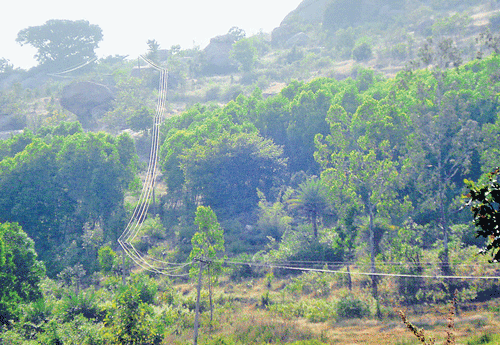
The Central Information Commission (CIC) has pulled up Environment Ministry for withholding information related to construction work in the ecologically- sensitive Amrut Mahal Kaval grasslands in Karnataka citing national security.
The major part of the area in Chitradurga district of Karnataka, which forms the habitat of the Great Indian Bustard, a bird nearing extinction, has been given to ISRO and Indian Institute of Science for building their facilities.
The area known as Amrit Mahal Kavals in Challakere taluk of Chitradurga district constitutes a critical component of the habitat of the last few remaining prominent faunal species of grasslands ecosystems in India.
Several groups in the region have raised objections saying the diversion of these lands will spell doom for the Bustard as well as the entire ecosystem of the region.
Appellants have alleged before the National Green Tribunal that, for seven projects, 9,273 acres of forest land has been diverted for non-forest purposes and allocated for various activities, as per confirmed figures. Besides, they said, 10,000 acres is being converted to station Indian Army, which is to be confirmed.
They had claimed such activities in Challakere Amrit Mahal Kavals are in violation of Section 2 of the Forest Conservation Act, 1980, according to which no state shall divert forest land for non-forest purposes without prior approval of the Central government.
NGT had ruled that it was clear that Karnataka state has diverted almost all of the Amrit Mahal Kavals of Challakere Taluk to non-forest and non-pastoral purposes without application of mind, the CIC noted.
It said the proposed investments will directly and irreversibly affect the impacted communities and biodiversity of the area, especially the pastoral communities, whose livelihoods are intricately linked to the preservation of these grasslands, it pointed out.
The RTI applicant had sought from Environment Ministry details of the ongoing projects in the region and whether the directives of NGT regarding conservation of the grasslands were being followed. The applicant also wanted to know whether any further land from the region was allocated despite NGT order, among others.
When the applicant, Davis George Thomas, did not get a satisfactory reply, he approached CIC.
"The Commission finds it is absolutely irrelevant and non- applicable the claim of the respondent authority that information sought is barred from disclosure under Section 8(1)(a) stating that it would impact the strategic security installations of the nation," Information Commissioner Sridhar Acharyulu said.
Recording his "displeasure", he said the ministry has not shown any evidence or convincing reason to establish how the disclosure of information about implementation of NGT order affects the security interests of the nation.
"It is ridiculous that MoEF did not understand the implication of their claim of this exemption. How can informing about implementation of environmental protection order of NGT affect the security of the country?" he quipped.
The Commissioner said orders of NGT are clear and specific that they pertain to various rights of the people.
"It is surprising that well-educated CPIOs who are senior scientists in environmental sciences have taken this stand without applying their minds to the rights of the people and environmental degradation," he said.
Acharyulu said the information sought was unduly delayed by the MoEF raising irrelevant grounds.
"The Commission, in exercise of its powers under Section 19(8)(b), directs MoEF to pay Rs 10,000 as compensation to the appellant and recommends not to claim serious exemptions without any seriousness, just to block the information sought as they did in this case and train their CPIOs properly to prevent such inordinate delay in disclosures like this," he said.